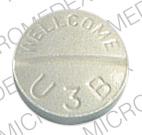Thioguanine
Generic name: thioguanine [ THYE-oh-GWA-neen ]
Brand name: Tabloid
Dosage form: oral tablet (40 mg)
Drug class: Antimetabolites
What is thioguanine?
Thioguanine is used to treat acute nonlymphocytic leukemia (a type of blood cancer), sometimes in combination with other cancer medicines.
Thioguanine may also be used for purposes not listed in this medication guide.
Thioguanine side effects
Get emergency medical help if you have signs of an allergic reaction: hives; difficulty breathing; swelling of your face, lips, tongue, or throat.
Stop using thioguanine and call your doctor if you have possible signs of liver damage:
-
stomach bloating, rapid weight gain;
-
unusual tiredness, trouble breathing while lying down;
-
nausea, loss of appetite, upper stomach pain; or
-
dark urine or jaundice (yellowing of the skin or eyes).
Thioguanine may cause serious side effects. Call your doctor at once if you have:
-
easy bruising, unusual bleeding;
-
bloody or tarry stools, coughing up blood or vomit that looks like coffee grounds; or
-
low blood cell counts--fever, chills, tiredness, mouth sores, skin sores, easy bruising, unusual bleeding, pale skin, cold hands and feet, feeling light-headed or short of breath.
Common side effects of thioguanine may include:
-
fever, chills, or other signs of infection; or
-
high uric acid levels.
This is not a complete list of side effects and others may occur. Call your doctor for medical advice about side effects. You may report side effects to FDA at 1-800-FDA-1088.
Warnings
Follow all directions on your medicine label and package. Tell each of your healthcare providers about all your medical conditions, allergies, and all medicines you use.
Before taking this medicine
You should not use thioguanine if you are allergic to it, or if you have ever used thioguanine or mercaptopurine and they were not effective in treating your condition.
Tell your doctor if you've ever had liver problems.
Thioguanine may be more effective in younger people than in older people. How well you respond to thioguanine may also depend on whether you've had prior treatments for leukemia.
Thioguanine may harm an unborn baby. Use effective birth control to prevent pregnancy, and tell your doctor if you become pregnant.
You should not breastfeed while taking thioguanine.
How should I take thioguanine?
Follow all directions on your prescription label and read all medication guides or instruction sheets. Your doctor may occasionally change your dose. Use the medicine exactly as directed.
You must remain under the care of a doctor while taking thioguanine.
You may be given other medications to help prevent certain side effects. Keep using these medicines for as long as your doctor has prescribed.
Thioguanine can increase your risk of bleeding or infection. You will need frequent blood tests, and your next dose may be delayed based on the results.
Thioguanine can also cause liver damage. You may need weekly or monthly blood tests to check your liver function.
Store at cool room temperature away from moisture and heat.
Related/similar drugs
cyclophosphamide, Cytoxan, cytarabine, daunorubicin, mitoxantrone, Novantrone
What happens if I miss a dose?
Call your doctor for instructions if you miss a dose of thioguanine.
What happens if I overdose?
Seek emergency medical attention or call the Poison Help line at 1-800-222-1222.
Overdose symptoms may include nausea, vomiting, sweating, feeling light-headed, decreased urination, fever, chills, or other signs of infection.
What should I avoid while taking thioguanine?
Do not receive a "live" vaccine while using thioguanine. Live vaccines include measles, mumps, rubella (MMR), rotavirus, typhoid, yellow fever, varicella (chickenpox), zoster (shingles), and nasal flu (influenza) vaccine.
Avoid being near people who are sick or have infections. Tell your doctor at once if you develop signs of infection.
What other drugs will affect thioguanine?
Thioguanine can harm your liver, especially if you also use certain medicines for infections, tuberculosis, birth control, hormone replacement, high cholesterol, heart problems, high blood pressure, seizures, pain, or arthritis (including Tylenol, Advil, Motrin, or Aleve).
Tell your doctor about all your other medicines, especially medicines to treat ulcerative colitis such as balsalazide, mesalamine, olsalazine, mesalamine, or sulfasalazine.
Other drugs may affect thioguanine, including prescription and over-the-counter medicines, vitamins, and herbal products. Tell your doctor about all your current medicines and any medicine you start or stop using.
More about thioguanine
- Check interactions
- Compare alternatives
- Drug images
- Latest FDA alerts (1)
- Side effects
- Dosage information
- During pregnancy
- Drug class: antimetabolites
- Breastfeeding
- En español
Patient resources
Other brands
Professional resources
Other brands
Related treatment guides
Further information
Remember, keep this and all other medicines out of the reach of children, never share your medicines with others, and use this medication only for the indication prescribed.
Always consult your healthcare provider to ensure the information displayed on this page applies to your personal circumstances.
Copyright 1996-2024 Cerner Multum, Inc. Version: 7.01.

